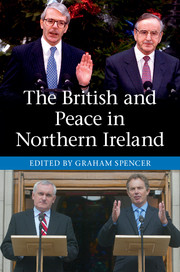Book contents
- Frontmatter
- Dedication
- Contents
- Notes on contributors
- Acknowledgements
- Brief chronology of the peace process
- Abbreviations
- Key documents
- Introduction
- 1 The terrain of discourse
- 2 The Anglo-Irish Agreement: an interview with Sir David Goodall and Lord Armstrong of Ilminster
- 3 The constitutional issue in Irish politics
- 4 Negotiations and positions: an interview with Sir John Chilcot
- 5 Resolving intercommunal conflict: some enabling factors
- 6 Tactics, strategy and space
- 7 The Joint Declaration and memory
- 8 Movement and transition in 1997: Major to Blair
- 9 The challenge of symmetry in dialogue: an interview with Sir Joseph Pilling
- 10 Why was the Good Friday Agreement so hard to implement?: lessons from ‘Groundhog Day’, 1998–2002
- 11 Text and context: an interview with William Fittall
- 12 The nature of dialogue: an interview with Sir Jonathan Phillips
- 13 Managing the tensions of difference: an interview with Jonathan Powell
- Conclusion
- Index
5 - Resolving intercommunal conflict: some enabling factors
Published online by Cambridge University Press: 05 March 2015
- Frontmatter
- Dedication
- Contents
- Notes on contributors
- Acknowledgements
- Brief chronology of the peace process
- Abbreviations
- Key documents
- Introduction
- 1 The terrain of discourse
- 2 The Anglo-Irish Agreement: an interview with Sir David Goodall and Lord Armstrong of Ilminster
- 3 The constitutional issue in Irish politics
- 4 Negotiations and positions: an interview with Sir John Chilcot
- 5 Resolving intercommunal conflict: some enabling factors
- 6 Tactics, strategy and space
- 7 The Joint Declaration and memory
- 8 Movement and transition in 1997: Major to Blair
- 9 The challenge of symmetry in dialogue: an interview with Sir Joseph Pilling
- 10 Why was the Good Friday Agreement so hard to implement?: lessons from ‘Groundhog Day’, 1998–2002
- 11 Text and context: an interview with William Fittall
- 12 The nature of dialogue: an interview with Sir Jonathan Phillips
- 13 Managing the tensions of difference: an interview with Jonathan Powell
- Conclusion
- Index
Summary
This chapter draws on ten years’ experience (1988–98) working in Northern Ireland in pursuit of a political settlement, and considers this as one example of an intercommunal conflict or a dispute involving minorities within states. Are there in such cases identifiable preconditions, or predisposing factors, to the achievement of a settlement? Before addressing this issue substantively, there are one or two preliminary points to be made. First, my own position. I was the associate political director in the Northern Ireland Office (NIO) from 1988 to 1991, and thereafter political director until 1998. As such, I was responsible, with colleagues, including those in other departments (in particular in the Cabinet Office and the Foreign and Commonwealth Office (FCO)), and under the direction of two successive permanent secretaries (Sir John Chilcot, until 1997, and Sir Joseph Pilling, each of whom had previously supervised me in stints as political director) for advising ministers on political development, the scope for achieving a peaceful settlement and, in respect of Northern Ireland, for Anglo-Irish relations. I was extremely fortunate in the support, encouragement and guidance I received from John and Joe. In Whitehall, a key variable is whether, when you are in a hole, your superiors join in burying you or jump in, grab a spade and help to dig you out. John and Joe are both of the latter camp. Equally they, and indeed other close colleagues, were adept at spotting holes, however camouflaged, and avoiding them. More generally, my colleagues in the NIO over ten years were characterised by ability, commitment and collective purpose. I was very fortunate to work closely with David Cooke, David Hill and Chris Maccabe (who have chapters in this volume) and with Jonathan Stephens, but there are many others.
- Type
- Chapter
- Information
- The British and Peace in Northern IrelandThe Process and Practice of Reaching Agreement, pp. 101 - 119Publisher: Cambridge University PressPrint publication year: 2015



